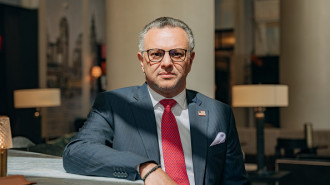Peshmerga forces secretly trained by Turkey
Turkey's military has been training Kurdish Peshmerga forces in northern Iraq for the past six weeks to counter the mutual threat of the Islamic State group, al-Araby al-Jadeed has learned.
Halgord Hekmat, a spokesman for the ministry of Peshmerga affairs in Iraq's autonomous Kurdish region, said on Monday that Turkish special forces had trained 150 Peshmerga fighters with heavy weapons.
|
This is only the beginning. The training that started... will continue. - Halgord Hekmat, Kurdish Regional Government |
The statement came after Turkish Prime Minister Ahmet Davutoglu announced on Friday in Erbil that the Turkish military was preparing to train Kurdish forces.
"This is only the beginning," Hekmat said. "The training that started in the Diana camp north of Erbil will continue, and the training camp is expected to be moved to a Peshmerga camp near the city of Sulaymaniyah."
Outgunned
Peshmerga forces have been battling IS in northern Iraq since the group launched a fierce campaign in June to capture Mosul, Iraq's second city, and other towns including Tikrit and Baiji.
Iraqi and Kurdish forces, backed by US coalition airpower, have since regained some territory. However, the Peshmerga are often outgunned by the IS fighters they face.
Hekmat said the Turkish government was "acting based on its national interests" and the training was not part of a wider deal. "It is completely aware of the threat posed by IS. And Baghdad is naturally aware of that," said Hekmat.
Kobane battle
Last month, Turkey allowed Peshmerga fighters to cross its territory to reach and defend the Syrian border town of Kobane, which IS was trying to capture from its Syrian Kurdish defenders.
Hekmat added that he did not expect Erbil to send more Peshmerga to Kobane, as the situation there was now more stable.
He said his forces were not planning to withdraw, and those who left Kobane would be replaced by fresh troops.
Hekmat said some Peshmerga had been captured by the IS group, but he did not reveal the number.
He said there had been no exchange of prisoners, and there were no direct talks between the two sides.
Securing the release of Peshmerga prisoners was accomplished by individual families with the help of mediators, and the regional authorities were not involved.
This article is an edited translation from our Arabic edition.

![Palestinians mourned the victims of an Israeli strike on Deir al-Balah [Getty]](/sites/default/files/styles/image_684x385/public/2024-11/GettyImages-2182362043.jpg?h=199d8c1f&itok=xSHZFbmc)


![The law could be enforced against teachers without prior notice [Getty]](/sites/default/files/styles/image_684x385/public/2178740715.jpeg?h=a5f2f23a&itok=hnqrCS4x)


